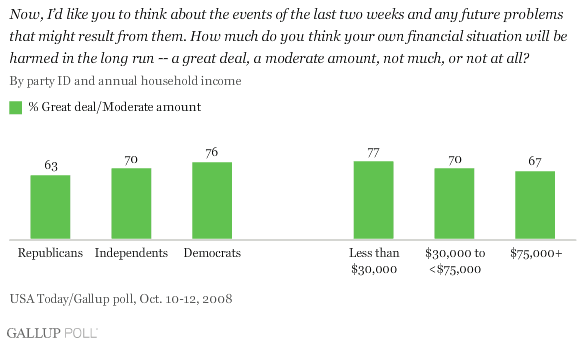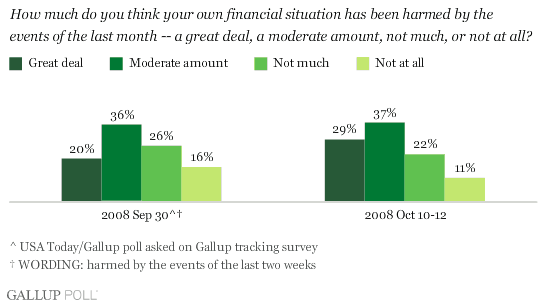PRINCETON, NJ -- Americans of all incomes and party affiliations report that the banking crisis of the past month has harmed their personal financial situations.

Most Americans Say They Will Be Hurt in Long Run
Given the banking crisis, the credit freeze, the various taxpayer bailouts, and the historic decline in the equity markets last week, it is not surprising that so many Americans believe the economic events over the past month have harmed their personal financial situations. Nor is it unexpected that the percentage saying they have been harmed "a great deal" or "a moderate amount" has increased from 56% at the end of September to 66% two weeks later.

On the other hand, some might think that the impact of the financial crisis will be disproportionately high on upper-income Americans since the latter tend to have more investable assets and therefore potentially more losses. However, the sharp reduction in credit availability tends to have a disproportionately negative impact on middle-income Americans. And job losses will affect everyone.
Probably of even greater economic concern is the generally held perception that the financial damage done by the chaos of the past two weeks will do long-term harm. The percentage of Americans holding this view ranges from 63% to 77% across income groups and party affiliations.

Commentary
There is no doubt that the current financial crisis and related credit freeze have done real damage not only in terms of Americans' assets and investments, but also to overall economic activity. For example, retail sales fell 1.2% in September -- the biggest drop in three years -- and those data don't reflect events of the past couple of weeks.
While the plunge in retail sales may be only the "tip of the iceberg" in terms of the immediate-term fallout from the financial crisis, of even greater concern is the potential longer-term impact. If all of the recent efforts to get the banking system working are successful and free up the credit markets in the near-term, some might hope that the long-term fallout from the recent financial chaos would be sharply negative, but brief -- something like the post-9/11 economy. When asked in the poll to guess the effects of the recent problems on the overall health of the economy, 47% said they expect it will involve only a temporary downturn from which the economy will soon recover.
On the other hand, 49% of Americans believe that the recent financial crisis reflects something of a more permanent change in the economy and that it will not recover for a long time. This may be somewhat prescient on the part of many Americans because no matter what is done, it is unlikely that either Wall Street or Main Street will soon return to the easy credit and high-risk excesses of the past several years.
The Great Depression of the 1930s had a profound psychological effect on the way everyone from financial advisers, bankers, and business executives to average Americans viewed credit, savings, risk, and homeownership, among many other things. It appears that about half of all Americans already perceive that the current financial debacle -- as the worst financial crisis since the Great Depression -- may have a similarly profound impact on their financial perspectives for years to come.
Survey Methods
Results are based on telephone interviews with 1,269 national adults, aged 18 and older, conducted Oct. 10-12, 2008. For results based on the total sample of national adults, one can say with 95% confidence that the maximum margin of sampling error is ±3 percentage points.
Interviews are conducted with respondents on land-line telephones (for respondents with a land-line telephone) and cellular phones (for respondents who are cell-phone only).
In addition to sampling error, question wording and practical difficulties in conducting surveys can introduce error or bias into the findings of public opinion polls.
